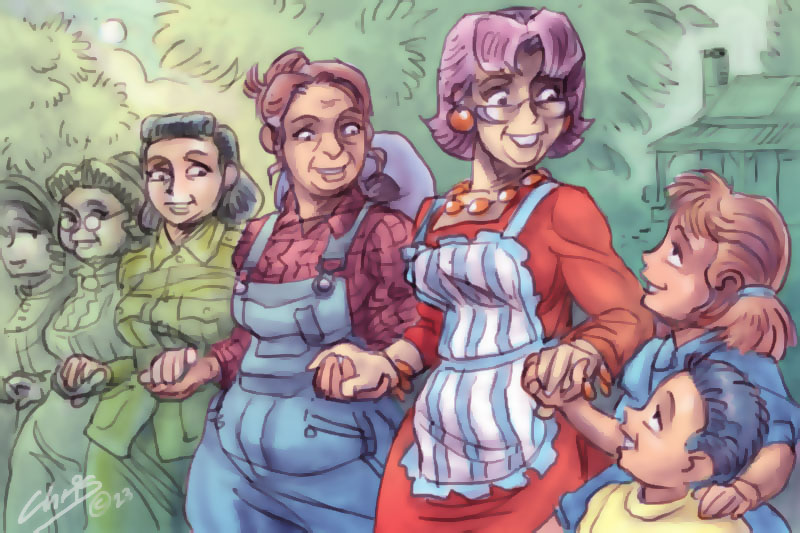Once, long years ago now, an experienced Australian geriatric nurse came to the village, at the time when my mother-in-law, whom I always called Yiayia (Granny) because the children did, had reached the stage of reminiscing endlessly and repetitively. She was in her early 80s, and I admit that I moaned to the visitor about this tendency. Robyn, however, brought me up short.

‘Your job at present is to allow Yiayia to replay the past, to process it.’
‘Replay it!’ I grumbled. ‘Sometimes she’s like a broken record.’ And immediately felt ashamed, for Yiayia’s past, after all, had been marked by years of war, poverty and struggle, by the kinds of hardship I had never known.
‘It doesn’t matter. The old have that right. With luck, we’ll be old ourselves one day.’
And now I am old, although not as old as Yiayia was then. And I think of Robyn and her wisdom quite often. I hope I’m not repeating myself too much, although I know I regularly forget to whom I’ve said what.
But the business of life review is definitely engrossing me, the more so as flashes of memory leap rather than swim into my ken apparently out of nowhere, but obviously out of deep recesses of the ageing brain. I remember my grandmother repeating what her mother had told her: You get it all back, Doris. I think the ancient ancestor might have had comeuppance rather than the cyclic nature of life in mind, but still.
'They were always loving and kind: they also taught me a great deal about the value of hard work and of persistence in the face of adversity such as drought, financial worry and persistent ill-health. All their lives, they clung to what was good, and managed to be entertaining and fair as well.'
I also think that with age, we become more aware of the people, apart from the obvious examples of our parents, who helped form us. They march through my memory now, these people: my grandparents and their many siblings, my teachers, the ministers and Sunday School teachers, my aunts and uncles, and my cousins. And my friends: I am still in touch with three people I met when we were all seven, even though oceans divide us: I wonder how many people can say that? Although my mother could, almost: she met her best friend when they were both aged 12, and in the first form of high school, and that friendship lasted for 60 years, until my mother died. But her best friend lives on, and has met two of my grandchildren.
The places are there, too: the farms, the townships, parts of suburbia, that sense of space dwindling. It was a less nomadic age: people usually stayed put, mostly doing their best to flower where they had been planted.
I suppose I remember my aunts best; my parents each had a sister. My father’s sister Fay had been a spoiled only girl: she was never allowed to do the washing up for fear of the effect on her pretty hands, but at 21 she married a dairy farmer (even though she was scared of cows) and had to change her ways. In between milking ninety cows, rearing pigs, and being a stalwart of the church and the Country Women’s Association, she raised four daughters, all of whom turned out well, as the saying goes.
My mother’s sister Muriel, always known as Moo, also raised four successful daughters. When she at last had a boy, she was quite bewildered at the novelty. But of course he also turned out very well: how could he miss, with four big sisters and an understanding mother? For Moo had had early maternal practice : eleven years older than my mother, her little sister, she often stood in for their own mother, an overworked woman who had been widowed early, and in the bad year of 1929.
Fay’s farm was part of a community, but so was Moo’s modest weatherboard in the western suburbs of Melbourne: everybody in the street knew everybody else, and one woman was even able to lay out those who had died. Moo knew all the neighbours, one of whom wept when Moo’s daughters came on a sentimental journey after her death. Another world, another era.
I spent long periods of time with Fay and Moo, both of whom are long gone. But how well I remember them, and how glad I am that I knew them. They were always loving and kind: they also taught me a great deal about the value of hard work and of persistence in the face of adversity such as drought, financial worry and persistent ill-health. All their lives, they clung to what was good, and managed to be entertaining and fair as well.
They taught me by example what a woman could be, and so did Yiayia: I hope I learned.
Gillian Bouras is an expatriate Australian writer who has written several books, stories and articles, many of them dealing with her experiences as an Australian woman in Greece.
Main image: Chris Johnston illustration.